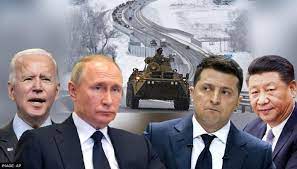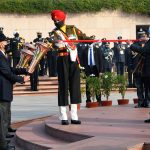IDR Blog
One Year on, Ukraine Conflict is Leading the World on to a Perilous Path
The stakes of all sides in the Ukraine conflict have risen with recent developments. President Biden’s dramatic visit to Kyiv ups the ante. NATO is expecting a renewed Russian offensive in eastern Ukraine. With that in view, Biden has signalled that US commitment to Ukraine will not waver. He announced on Ukrainian soil another $500 million of arms aid. He has marked his personal commitment to President Zelenskyy and the war by the five-hour stopover in Kyiv, despite the serious security issues involved in visiting an active war zone. This ostentatious show of solidarity with Ukraine and the accompanying rhetoric, as well as the visit to Poland which is most hawkish on a war with Russia and is the staging ground for training and arms transfer to Ukraine, does not hold out much hope of a negotiated way out of this conflict in the months ahead.
At the Munich Security Conference, the panel on the “War in Ukraine” consisting of the Foreign Ministers of the US (Blinken), Germany (Baerbock) and Ukraine (Kuleba) only discussed support for the war against Russia, with no effort to realistically probe the conditions for a potential negotiated way out. Kuleba stated his country’s maximalist demands, namely, the recovery of all territories annexed by Russia, reparations by Moscow and trial for war crimes committed by Russia, and Blinken and Baerbock tacitly endorsed this by remaining silent. The German FM, as is her wont, resorted to moral posturing, as if this is the first time in recent history that a big power has committed aggression against another country or violated its sovereignty. This refusal to recognise the role of the West in the break-up of Yugoslavia, the bombing of Serbia, the invasion of Afghanistan, Iraq, Libya and Syria, which the rest of the world is only too aware of, continues to expose the gap between rhetoric and reality on the narrative that the West has built up on Ukraine. Russia and Iran were not invited to the Munich Security Conference (MSC) this year, though neither European security nor that of West Asia can be seriously discussed without their participation. This turned this year’s MSC into essentially a NATO echo chamber or a Conference on Insecurity.
Blinken even opposed an immediate cease-fire, as that would, according to him, give Russia time to re-mobilise men and material and re-attack with more vigour later. The manner in which the Ukraine conflict has been personalised around the figure of President Putin, called a murderer, is diplomatically unconscionable. The contrast between Putin refusing to demonise Western leaders in person and the constant personal demonisation of Putin by the West is stark.
At Munich, Blinken warned China against the supply of lethal arms to Russia, threatening Beijing with adverse consequences. The EU has expressed concern in this regard too. While India has no reason to countenance Chinese supply of arms to Russia and has reasons for concern at the deepening of strategic ties between the two countries, purely logically, if the US and the EU can funnel huge supplies of lethal arms to Ukraine why cannot China, if it so chooses, supply such arms to Russia. This brings us back to the fundamental geopolitical error by the US to treat both Russia and China as adversaries, create every reason to push them into a tighter strategic embrace, and then try to persuade China with threats not to support Russia.
The yawning gap between how Putin sees the Ukraine issue and how the US and NATO see it is apparent from the Russian President’s State of the Nation Address on February 21. The two sides have a diametrically opposed view of the situation. Putin lashed out at the West politically and culturally, seeing the confrontation as a watershed moment for Russia. He accused the West of using the principles of democracy and freedom to impose its “totalitarian values”, seeking unlimited power in world affairs, and of using Ukraine as a military base to fight Russia. He blamed Ukraine and the West for starting the war, which he described was “not just military and information, but also an economic aggression” against Russia, without, however, achieving success in any of these areas.
He added that while trillions of dollars were at stake for the West, Russia’s income flows had not dried up. He observed that contrary to IMF’s predictions that Russia’s GDP would fall 12 percent after sanctions, it fell by only 2.1 percent. The West, he said, had converted a local war into a global confrontation, noting that it sought the strategic weakening of Russia, indeed to carve up the country and steal its vast natural resources. In sum, the sense of his speech reflected starkly the total breakdown of relations between Russia and the West.
Putin saw the people of Ukraine as hostages of the Kyiv regime, the people of Donbas subjected to undisguised hatred and constant shelling. He decried the looming spiritual catastrophe facing western populations with destruction of families and cultural and national identities. This way he distinguished Russia’s conservatism from western liberalism. Conscious of the casualties Russia has suffered he announced several relief measures and subsidies for the affected families. He outlined many infrastructure developmental projects. He had harsh words to say to those Russians who had preferred to invest in luxury lifestyles in the West instead of investing at home and, noting their properties and assets had been confiscated, reminded them that they will always be considered second-class citizens there.
Putin’s decision to suspend Russia’s participation in the New Start Treaty which was extended till 2026 has attracted special attention. This was the only nuclear arms control treaty that has survived the US-Russia confrontation. Putin clarified that Russia was not withdrawing from it, with a subsequent clarification that the ceilings in the treaty on warheads and delivery systems would be honoured. His logic is that at a time when the West seeks Russia’s strategic defeat, providing US inspectors access to Russia’s nuclear sites is not possible, as information about them could be passed on to the Ukrainian side to target them, as has happened with Ukrainian drone attacks on Russia’s strategic bases. Putin has also called for future nuclear arms control talks to include the French and UK nuclear arsenals, giving NATO’s strategic threat to Russia. He also said that as per their information parts of the aging US nuclear would need replacement for which they would need to test, and if they do Russia would also do nuclear testing to ensure strategic parity. He also announced that he had put new strategic Russian weapons on combat duty.
The US and NATO have expressed regret at this unfortunate decision and have asked Russia to review it. The Russian decision has implications for the nuclear disarmament issue in general. Although the five established nuclear weapon states have not moved towards total elimination of nuclear weapons as was envisaged by the Non-Proliferation Treaty, and this has been an issue that has bedevilled the NPT Review Conferences, the nuclear weapons reduction treaties between the two principal nuclear powers have helped to preserve the fundamental bargain of the NPT, namely, that countries would give up the nuclear option if the NW states moved towards nuclear disarmament. If that process is abandoned — as looks very likely now — and if testing is resumed, the NPT structure would surely break down. Already it is being strained with North Korea abandoning the NPT, the Iranian nuclear issue re-opened, Russian claims that Ukraine seeks access to nuclear weapons, and nuclear sharing demands being made in Europe in the wake of the Ukraine conflict.
All in all, the Ukraine conflict is leading the world on to a perilous path.
Post your Comment
One thought on “One Year on, Ukraine Conflict is Leading the World on to a Perilous Path”
 Loading Comments
Loading Comments





Why is Russia Pissed with Ukraine – It’s Billions in Lost Royalty, and Security Risks https://rbt-defense.blogspot.com/2023/03/why-is-russia-pissed-with-ukraine-its.html